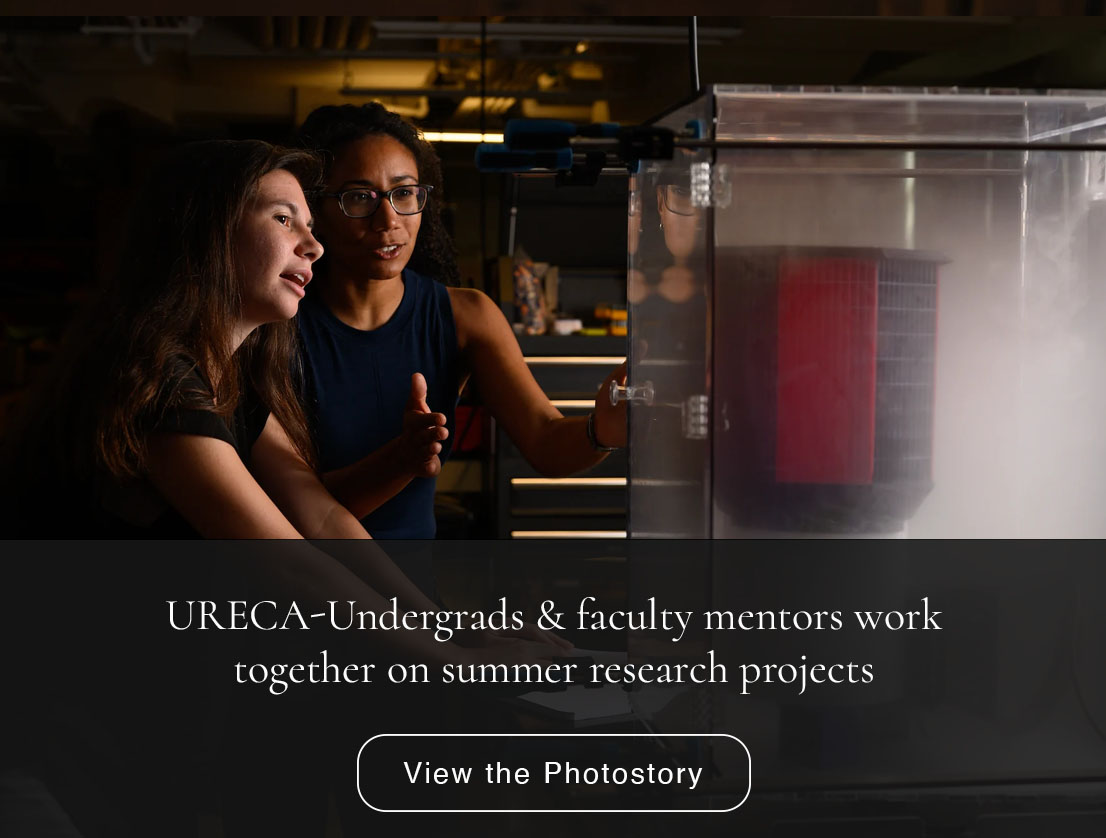Hands-on research makes a real-world difference
Highlights
- Undergrads and faculty mentors collaborated on more than 50 research projects funded this summer by Wake Forest’s Undergraduate Research and Creative Activities Center.
- Projects underway explored drug uptake in cells, environmentally-friendly fertilizer production and high-intensity interval exercise for older adults.
- A photo story highlights a few of the student faculty teams. Two short videos share the student researchers' perspectives.
Research on how ions move through cells may help provide a less costly and time-consuming way to predict drug uptake in cancer therapies. Experiments and simulations combining chemistry and physics could help develop a more environmentally-friendly way to produce fertilizer. A pilot study could be a first step in figuring out how high-intensity interval training could improve brain health for older adults.
The undergraduates and faculty mentors collaborating on these studies are just three examples of the more than 50 research projects funded this summer by Wake Forest’s Undergraduate Research and Creative Activities Center (URECA).
URECA fellows spend 10 weeks collaborating with faculty mentors in concentrated work within their area of interest. They are awarded a $4,000 stipend, on-campus housing for the summer, and an opportunity to contribute to work that may someday be life-changing.
Junior chemistry major Sydney Riemer works with engineering professor Erin Henslee to investigate how ions move through and around cells to help predict drug uptake in cancer therapies.
Senior health and exercise science major Ainsley Pierson has been an active volunteer in professor Kristen Beaver’s research program since she was a sophomore. But a URECA summer research fellowship offered something more. Piersen and Beavers are working to move forward data in support of a concept that gravitational loading for bone health is sensed by weight-bearing bones and can influence appetite.
“With the protected time afforded by the URECA fellowship, it was exciting to see Ainsely take the next step in her research training, transitioning from a hands-on experiential learning opportunity to beginning to think independently about a scientific question, critically review relevant literature, and ultimately generate and interpret her own data,” said Beavers.
She describes summer research as a win-win. “The students get an opportunity to work one-on-one with a faculty member to learn about and contribute to an active area of research that might not get moved forward without the energy and enthusiasm they bring to the table.”
Since 2008, URECA has funded more than 800 summer scholars. Working closely with a faculty mentor provides students with personalized guidance and support. They can also help students navigate the research process, from formulating research questions to analyzing data and presenting findings. This mentorship relationship fosters a collaborative and supportive learning environment, where students can receive feedback and guidance to improve their research skills.
Below left: Junior Kirstin Murr works on research with engineering professor Lauren Lowman. to test different configurations of fog gauge sensors.
Below right: Senior Kyle Alves is helping health and exercise science professor Jeff Katula conduct a pilot study to see if high-intensity interval resistance training improves brain health for adults 65 plus.
Hands-on research with a faculty mentor also gives students an opportunity to build professional networks and connections. Through their research projects, students may have the opportunity to collaborate with other researchers, attend conferences, or publish their work. These experiences can open doors to future research opportunities, internships, or even job offers.
Wake Forest photographer Lyndsie Schlink and our social and videography team Mary K Birch and Mike Shaw visited a few faculty-student URECA research teams over the summer. Their photos and videos offer a glimpse of the work underway.
Categories: Top Stories


